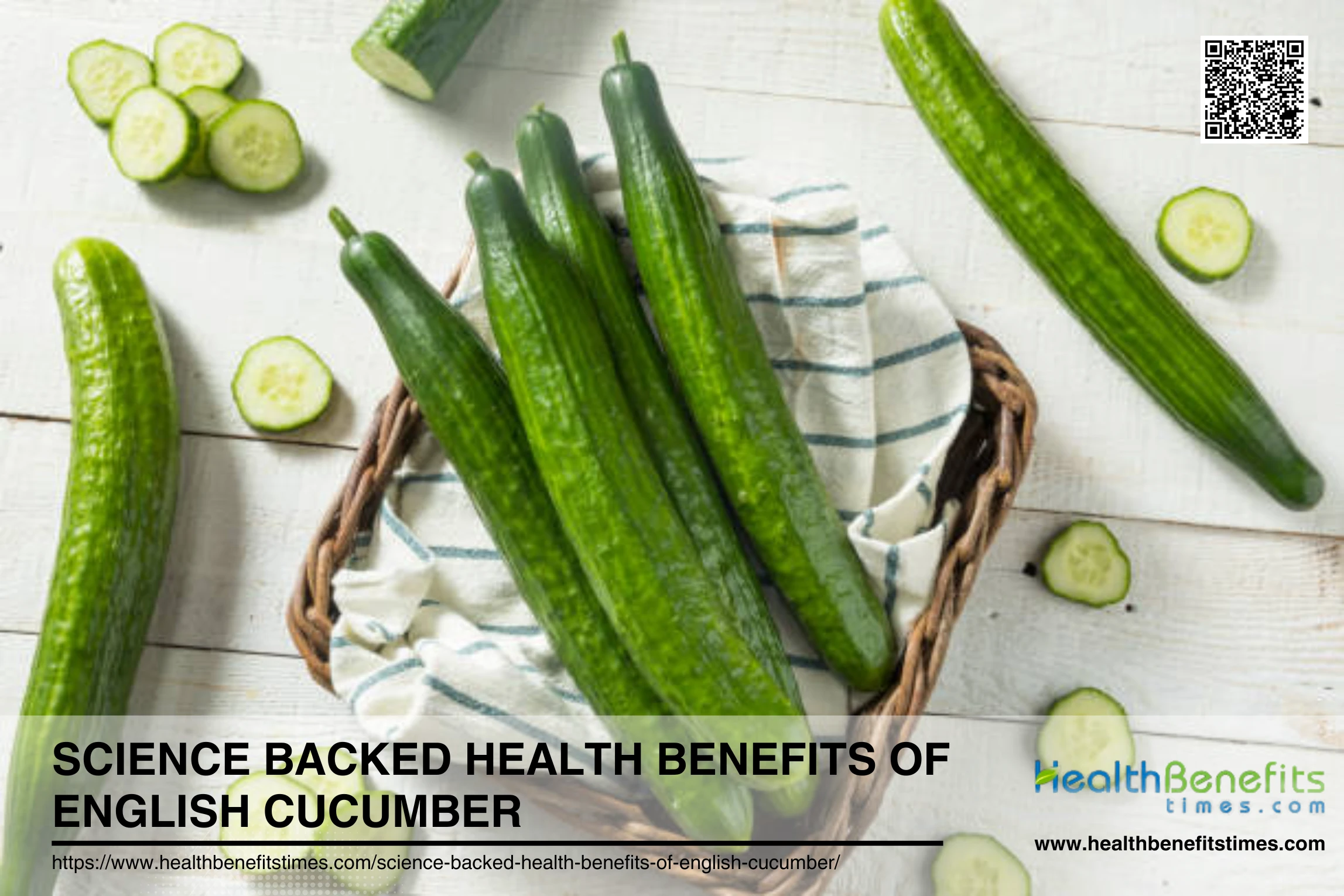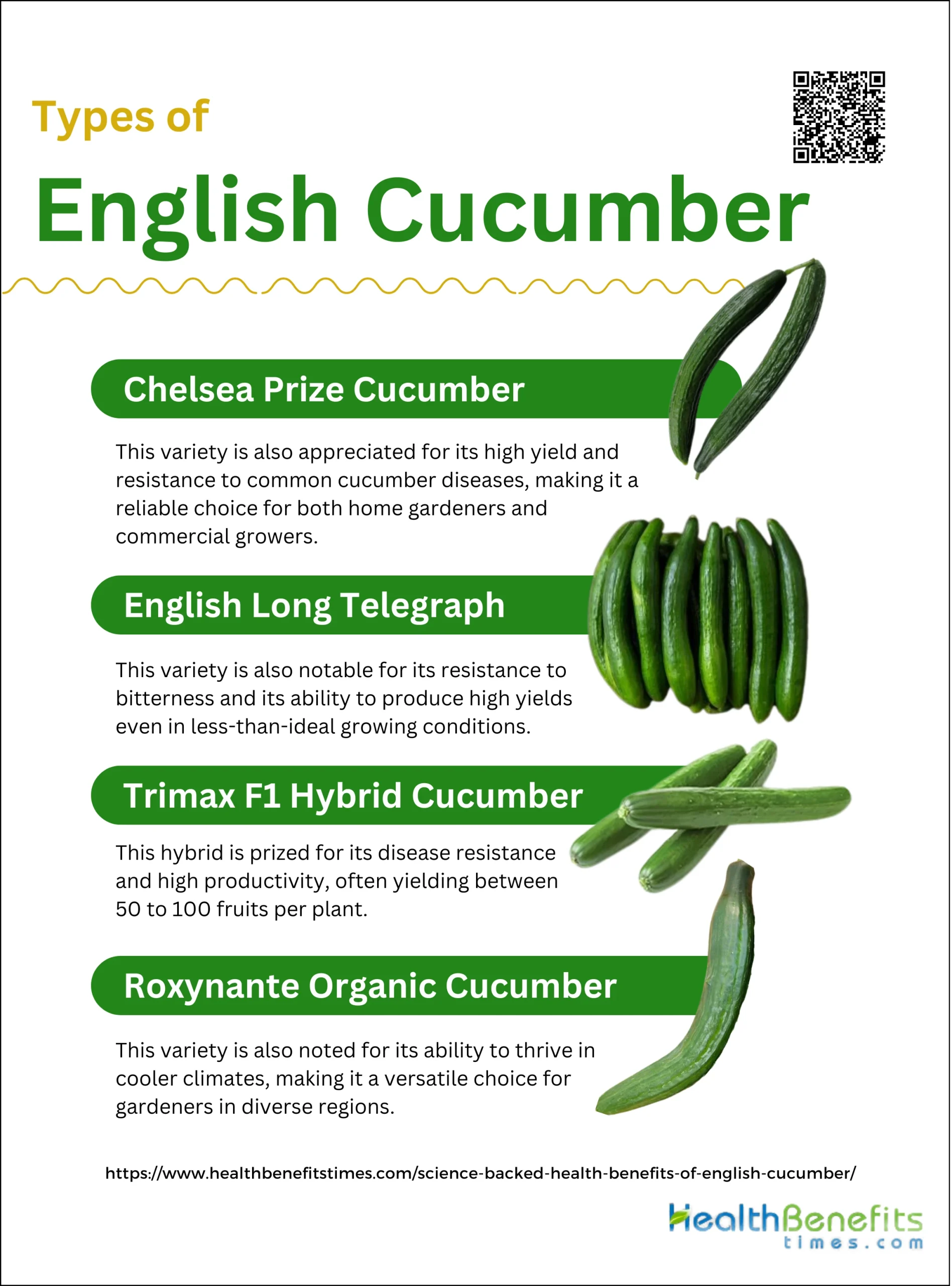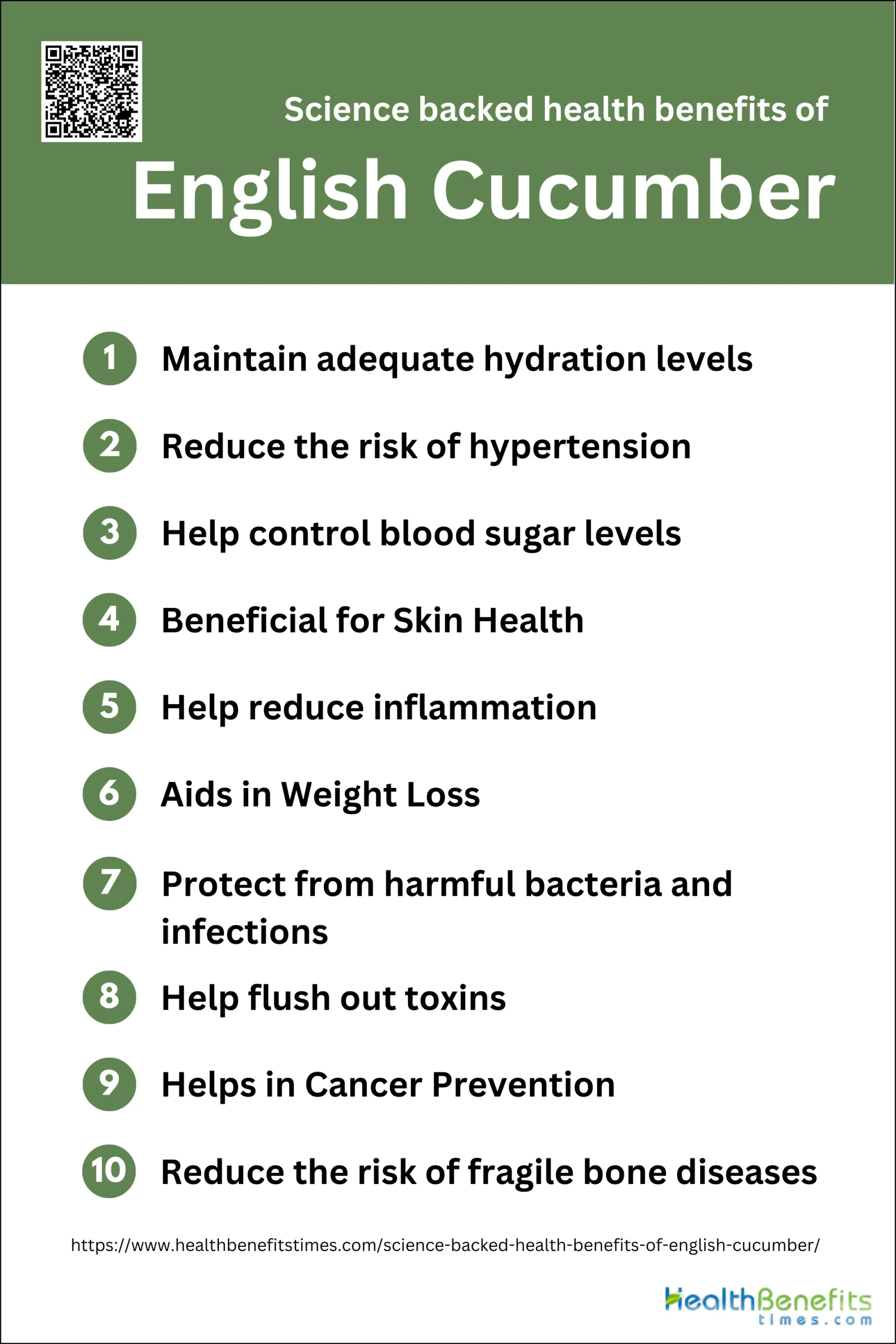 Crunchy, refreshing, and packed with nutrients, English cucumbers are more than just a cool addition to your salad. This versatile fruit, often mistaken for a vegetable, boasts a wealth of science-backed health benefits that make it a must-have in any diet. From promoting hydration and aiding in weight loss to supporting cardiovascular health and potentially reducing the risk of certain cancers, English cucumbers are a powerhouse of essential vitamins, minerals, and antioxidants. Their high water content, combined with fiber and beneficial plant compounds, helps in maintaining optimal health by improving digestion, lowering blood pressure, and enhancing bone health. Dive into the myriad ways this humble fruit can elevate your well-being and discover why English cucumbers deserve a prominent place on your plate.
Crunchy, refreshing, and packed with nutrients, English cucumbers are more than just a cool addition to your salad. This versatile fruit, often mistaken for a vegetable, boasts a wealth of science-backed health benefits that make it a must-have in any diet. From promoting hydration and aiding in weight loss to supporting cardiovascular health and potentially reducing the risk of certain cancers, English cucumbers are a powerhouse of essential vitamins, minerals, and antioxidants. Their high water content, combined with fiber and beneficial plant compounds, helps in maintaining optimal health by improving digestion, lowering blood pressure, and enhancing bone health. Dive into the myriad ways this humble fruit can elevate your well-being and discover why English cucumbers deserve a prominent place on your plate.
What is English Cucumber?
English cucumber (Cucumis sativus) is a variety of cucumber that is characterized by its long, slender shape and smooth, dark green skin. It is commonly grown in greenhouses and is known for its mild flavor and minimal seeds, making it a popular choice for fresh consumption. Research has shown that various factors such as nutrient concentration, light intensity, and spectral quality can significantly affect the shelf life and quality of English cucumbers. For instance, high nutrient concentrations can enhance fruit color and prolong shelf life, although they may reduce the number of marketable fruits per plant. Additionally, light intensity and spectral quality play crucial roles in maintaining the greenness and extending the shelf life of the fruit, with higher light intensities and red light being particularly beneficial. Post-harvest treatments, such as ultraviolet-C (UV-C) light sanitization, have also been found to delay quality loss and extend the shelf life of packaged English cucumbers by reducing bacterial populations. These findings highlight the importance of optimizing growing and post-harvest conditions to improve the quality and longevity of English cucumbers.
Nutritional Profile of English Cucumber
English cucumbers are a nutritional powerhouse, offering a variety of essential nutrients while being incredibly low in calories. They are primarily composed of water, making them an excellent hydrating snack. Additionally, they contain small amounts of carbohydrates and protein, along with dietary fiber that aids in digestion. English cucumbers are rich in several vitamins and minerals, including Vitamin K, which is crucial for blood clotting and bone health, and Vitamin C, an antioxidant that supports immune function and skin health. They also provide potassium and magnesium, which are essential for maintaining proper muscle and nerve function. This nutrient-dense profile makes English cucumbers a valuable addition to any diet.
High Water Content: Hydration Benefits
One of the standout features of English cucumbers is their exceptionally high water content, which can be as much as 95%. This makes them an excellent choice for staying hydrated, especially during hot weather or after physical activity. Proper hydration is vital for maintaining bodily functions, including temperature regulation, joint lubrication, and nutrient transport. Consuming water-rich foods like English cucumbers can help meet daily hydration needs more effectively than drinking water alone. Moreover, the water content in cucumbers can aid in detoxifying the body by flushing out toxins and supporting kidney function, making them a refreshing and health-boosting snack.
Essential Vitamins and Minerals: Vitamin K, Vitamin C, Potassium, Magnesium
English cucumbers are a rich source of several essential vitamins and minerals that contribute to overall health. Vitamin K is abundant in cucumbers, playing a critical role in blood clotting and bone metabolism. Vitamin C, another key nutrient, acts as a powerful antioxidant, protecting the body against free radicals and boosting the immune system. Additionally, English cucumbers provide potassium, which helps regulate blood pressure and supports cardiovascular health, and magnesium, which is necessary for muscle and nerve function, as well as energy production. These vitamins and minerals collectively enhance various bodily functions, making English cucumbers a nutritious and beneficial food choice.
Low in Calories: Ideal for Weight Management
English cucumbers are incredibly low in calories, with a single cup containing only about 16 calories. This makes them an ideal food for those looking to manage or lose weight. Their high water and fiber content can promote feelings of fullness and reduce overall calorie intake by curbing hunger. Incorporating cucumbers into meals and snacks can help create a calorie deficit without sacrificing nutritional value. Additionally, their refreshing taste and versatility make them a great addition to a variety of dishes, from salads and sandwiches to smoothies and dips, providing a satisfying yet low-calorie option for weight-conscious individuals.
Types of English Cucumber
Dive into the diverse world of English cucumbers, where each variety offers a unique blend of flavor, texture, and culinary potential. Far from being a one-size-fits-all vegetable, English cucumbers come in an array of fascinating varieties, each with its own distinct characteristics and growing requirements. Whether you’re a home gardener looking to expand your crop selection, a chef seeking the perfect cucumber for your next culinary creation, or simply a food enthusiast eager to explore new tastes, this article will introduce you to the most popular and intriguing varieties of English cucumbers. From the classic long and slender types to innovative hybrids bred for disease resistance and enhanced flavor, we’ll explore the unique traits that set each variety apart. Get ready to discover the subtle nuances in taste, appearance, and growing habits that make each of these English cucumber varieties special, and find out which ones might be the perfect fit for your garden or kitchen.
1. Chelsea Prize Cucumber
The Chelsea Prize Cucumber is a renowned variety of English cucumber, celebrated for its exceptional quality and flavor. This variety is particularly valued for its long, straight shape and smooth, dark green skin. The Chelsea Prize is known for its crisp texture and mild taste, making it a favorite for fresh salads and garnishes. It typically grows to about 12-14 inches in length and is virtually seedless, which enhances its appeal for those who prefer cucumbers without the bitterness that seeds can impart. This variety is also appreciated for its high yield and resistance to common cucumber diseases, making it a reliable choice for both home gardeners and commercial growers.
2. English Long Telegraph Cucumber
The English Long Telegraph Cucumber is an heirloom variety that has been cherished for over a century. Known for its impressive length, often reaching up to 14 inches, this cucumber is a staple in many gardens due to its consistent quality and productivity. The Long Telegraph has a thin, tender skin and a mild, sweet flavor, making it ideal for fresh consumption. Its long, slender shape is perfect for slicing, and it is often used in salads, sandwiches, and as a garnish. This variety is also notable for its resistance to bitterness and its ability to produce high yields even in less-than-ideal growing conditions.
3. Trimax F1 Hybrid Cucumber
The Trimax F1 Hybrid Cucumber is a modern variety designed for organic and sustainable farming. This hybrid is prized for its disease resistance and high productivity, often yielding between 50 to 100 fruits per plant. The Trimax can grow up to 15 inches long, making it one of the longest English cucumber varieties available. Its fruits are known for their uniform shape, smooth skin, and excellent flavor. The Trimax is particularly popular among organic growers because it requires fewer chemical treatments to thrive, making it an environmentally friendly choice. Its robust growth and high yield make it a favorite for both home gardeners and commercial producers.
4. Roxynante Organic Cucumber
The Roxynante Organic Cucumber is a parthenocarpic variety, meaning it does not require pollination to produce fruit. This characteristic makes it an excellent choice for greenhouse cultivation and regions with fewer pollinators. The Roxynante produces long, straight cucumbers that are virtually seedless and have a mild, sweet flavor. It is known for its rapid growth, maturing in as little as 45 days, and its resistance to common cucumber diseases. This variety is also noted for its ability to thrive in cooler climates, making it a versatile choice for gardeners in diverse regions. The Roxynante’s organic certification and high-quality fruit make it a preferred option for health-conscious consumers and organic farmers alike.
Science backed health benefits of English Cucumber
Discover the refreshing world of English cucumbers and unlock a treasure trove of science-backed health benefits that will make you reach for this crisp, green delight more often. Far from being just a salad staple, English cucumbers are packed with nutrients that can boost your overall well-being in surprising ways. From supporting heart health to aiding in weight management, these versatile fruits (yes, they’re technically fruits!) offer a myriad of advantages backed by scientific research. In this article, we’ll dive into the top health benefits of English cucumbers, exploring how this low-calorie, nutrient-dense food can hydrate your body, support your immune system, and even help manage chronic conditions. Get ready to learn why incorporating English cucumbers into your diet is not just a tasty choice, but a smart move for your health.
1. Maintain adequate hydration levels
English cucumbers are an excellent choice for maintaining adequate hydration levels, thanks to their exceptionally high water content, which can be as much as 95%. This makes them a superb hydrating snack, especially during hot weather or after physical activity. Proper hydration is crucial for numerous bodily functions, including temperature regulation, nutrient transport, and joint lubrication. Consuming water-rich foods like English cucumbers can help meet daily hydration needs more effectively than relying on water alone. Additionally, the hydration benefits of cucumbers extend to detoxifying the body by aiding in the elimination of toxins and supporting kidney function.
What Research Says?
- Cucumbers are effective in regulating hydration levels in the body due to their high water content. This helps in maintaining adequate hydration, which is essential for overall health.
- Cucumbers contain essential nutrients such as potassium, magnesium, and vitamins A, C, and K, which contribute to their hydrating properties and overall health benefits.
2. Reduce the risk of hypertension

Incorporating English cucumbers into your diet can play a significant role in reducing the risk of hypertension, commonly known as high blood pressure. These cucumbers are rich in potassium, a vital mineral that helps balance sodium levels in the body and relaxes blood vessel walls, thereby reducing blood pressure. Additionally, their high water content aids in maintaining proper hydration, which is essential for optimal cardiovascular function. The presence of magnesium in English cucumbers further supports heart health by promoting smooth muscle function and enhancing blood flow. By including this low-calorie, nutrient-dense food in your meals, you can enjoy a natural and delicious way to help manage and lower the risk of hypertension, contributing to overall heart health and well-being.
What Research Says?
- Cucumber contains potassium, which helps in reducing blood pressure by promoting sodium excretion and vasodilation, thereby lowering blood pressure.
- Studies have shown that consuming cucumber juice can significantly reduce blood pressure in hypertensive patients, particularly in the elderly.
- Increased long-term intake of fruits and vegetables, including cucumbers, is associated with a reduced risk of developing hypertension.
3. Help control blood sugar levels
English cucumbers can be a valuable ally in helping to control blood sugar levels, making them an excellent choice for individuals managing diabetes or those aiming to maintain stable glucose levels. Despite their sweet and refreshing taste, these cucumbers have a low glycemic index, meaning they don’t cause rapid spikes in blood sugar when consumed. Their high water and fiber content contribute to slower digestion and absorption of sugars, helping to prevent sudden glucose surges. Additionally, cucumbers contain a compound called cucurbitan, which may help regulate insulin release and glucose metabolism. The presence of magnesium in English cucumbers further supports insulin function, potentially improving the body’s ability to process sugar effectively. By incorporating these nutrient-rich, low-calorie vegetables into a balanced diet, individuals can enjoy a natural and tasty way to support healthy blood sugar management while benefiting from their array of other nutritional advantages.
What Research Says?
- Cucumber methanol extract significantly reduced blood sugar levels in diabetic rats, bringing them to values comparable to non-diabetic rats.
- Cucumber juice consumption significantly reduced fasting blood sugar (FBS) and glycated hemoglobin (HbA1c) in women with type 2 diabetes.
4. Beneficial for Skin Health

English cucumbers are a boon for skin health, offering a range of benefits that can enhance your complexion and overall skin vitality. Their high water content helps keep the skin hydrated, which is essential for maintaining a healthy, youthful appearance. Rich in antioxidants like Vitamin C and beta-carotene, English cucumbers help combat free radicals that can cause premature aging and skin damage. Additionally, they contain silica, a mineral that promotes collagen production, improving skin elasticity and reducing the appearance of wrinkles. The anti-inflammatory properties of cucumbers can soothe irritated skin, reduce puffiness, and alleviate sunburns when applied topically. Whether consumed as part of your diet or used in skincare routines, English cucumbers provide a natural and effective way to nourish and rejuvenate your skin.
What Research Says?
- Cucumbers are composed of about 95% water, which provides superior hydration to the skin, helping to maintain its moisture and elasticity.
- They have anti-inflammatory properties that soothe skin irritations and reduce swelling, making them effective in treating conditions like sunburn and skin discoloration.
5. Help reduce inflammation
English cucumbers are a potent ally in the fight against inflammation, thanks to their rich array of antioxidants and anti-inflammatory compounds. These cucumbers contain flavonoids and tannins, powerful antioxidants that help neutralize free radicals and reduce oxidative stress in the body, a key factor in chronic inflammation. Cucurbitacin E, a compound found in cucumbers, has been shown to have significant anti-inflammatory effects, potentially helping to alleviate symptoms of inflammatory conditions such as arthritis. The high water content in English cucumbers also aids in flushing out toxins from the body, further reducing inflammation. Additionally, their vitamin K content supports the body’s natural anti-inflammatory processes. By incorporating English cucumbers into your diet regularly, you can harness these natural anti-inflammatory properties to support overall health and potentially reduce the risk of chronic diseases associated with long-term inflammation.
What Research Says?
- The iminosugar idoBR1, isolated from cucumbers, has been shown to reduce inflammatory activity by inhibiting lipopolysaccharide (LPS)-induced tumor necrosis factor alpha (TNF-α) in THP-1 cells and human blood. It also inhibits sialidases and reduces the binding of hyaluronic acid to CD44 in LPS-stimulated cells, which may contribute to its anti-inflammatory effects.
- A systematic review and meta-analysis found that higher intakes of fruits and vegetables, including cucumbers, are associated with reduced levels of inflammatory biomarkers such as C-reactive protein and TNF-α. This suggests that a diet rich in fruits and vegetables can help reduce systemic inflammation.
- Cucumber has been noted for its various therapeutic properties, including anti-inflammatory effects. It contains several bioactive compounds like cucurbitacins and flavonoids, which contribute to its health benefits. These compounds have been shown to have antioxidant and anti-inflammatory activities, supporting the traditional use of cucumber in reducing inflammation and soothing skin irritations.
6. Aids in Weight Loss

English cucumbers are an excellent addition to any weight loss regimen, offering a multitude of benefits that support healthy weight management. With their remarkably low calorie content – just about 16 calories per cup – they provide a satisfying crunch and refreshing taste without adding significant calories to your diet. The high water content in English cucumbers helps promote a feeling of fullness, potentially reducing overall calorie intake by curbing hunger and snack cravings. Additionally, their fiber content aids in digestion and helps maintain a healthy gut microbiome, which is increasingly recognized as crucial for weight management. The natural diuretic properties of cucumbers can also help reduce water retention and bloating, contributing to a slimmer appearance. By incorporating English cucumbers into meals and snacks, you can enjoy a nutrient-dense, low-calorie option that supports your weight loss goals while providing essential vitamins and minerals for overall health.
What Research Says?
- Cucumbers help in weight loss by reducing fat content in the body. This is attributed to their high water content and low calorie count, making them an ideal food for weight management.
- Cucumbers are rich in essential nutrients such as fiber, potassium, magnesium, manganese, and vitamins A, C, and K. These nutrients contribute to overall health and can support weight loss by promoting better digestion and metabolism.
7. Protect from harmful bacteria and infections
English cucumbers possess natural antibacterial properties that can help protect the body from harmful bacteria and infections. These cucumbers contain compounds such as tannins and flavonoids, which have been shown to exhibit antimicrobial activity, effectively inhibiting the growth of certain bacteria and pathogens. The high water content in cucumbers also supports overall hydration, which is crucial for maintaining a robust immune system capable of warding off infections. Additionally, the presence of Vitamin C in English cucumbers boosts the immune response, further enhancing the body’s ability to fight off bacterial invasions. By incorporating English cucumbers into your diet, you can leverage their natural antibacterial properties to help safeguard your health and reduce the risk of infections, all while enjoying their refreshing taste and numerous other nutritional benefits.
What Research Says?
- Certain strains of Pseudomonas and Serratia plymuthica can induce resistance in cucumber plants, leading to increased production of antifungal compounds and physical barriers that inhibit pathogen colonization.
- Trichoderma species, such as T. harzianum and T. asperellum, enhance cucumber defense mechanisms by regulating metabolic pathways and inducing systemic resistance, which reduces disease symptoms and pathogen proliferation.
8. Help flush out toxins
English cucumbers are highly effective in helping to flush out toxins from the body, thanks to their high water content and natural diuretic properties. Composed of about 95% water, these cucumbers promote hydration, which is essential for the kidneys to function optimally and eliminate waste products efficiently. The diuretic effect of cucumbers encourages increased urine production, aiding in the removal of excess salts, waste, and toxins from the bloodstream. Additionally, the presence of antioxidants like Vitamin C and beta-carotene in cucumbers helps neutralize free radicals and reduce oxidative stress, further supporting the body’s detoxification processes. By incorporating English cucumbers into your diet, you can enjoy a natural and refreshing way to enhance your body’s ability to cleanse itself, contributing to overall health and well-being.
What Research Says?
- Cucumber has been shown to possess strong antioxidant properties, which help in reducing oxidative stress and promoting detoxification processes in the body.
- Melatonin treatment in cucumbers boosts the activity of glutathione S-transferase and other antioxidant enzymes, facilitating the detoxification of pesticides such as imidacloprid (IMD).
- Cucumber has a natural cleansing action within the body, helping to remove accumulated waste materials and chemical toxins.
9. Helps in Cancer Prevention

English cucumbers may play a role in cancer prevention, thanks to their rich content of antioxidants and anti-inflammatory compounds. These cucumbers contain cucurbitacins, which are bioactive compounds known for their potential anti-cancer properties. Cucurbitacins can inhibit the growth of cancer cells and induce apoptosis, or programmed cell death, in various types of cancer. Additionally, the high levels of antioxidants such as Vitamin C and beta-carotene in English cucumbers help neutralize free radicals, reducing oxidative stress and DNA damage that can lead to cancer development. The anti-inflammatory properties of cucumbers further support cancer prevention by reducing chronic inflammation, a known risk factor for many cancers.
What Research Says?
- Cucumbers contain Cucurbitacin B (CuB), a bioactive compound that inhibits prostate cancer growth by inducing apoptosis and inhibiting ATP citrate lyase phosphorylation, a key enzyme in cancer metabolism.
- Cucumbers are rich in various nutrients and bioactive compounds, including fiber, potassium, manganese, magnesium, and vitamins K, C, and A, which contribute to their health benefits, including potential cancer prevention.
- Cucumbers are rich in various nutrients and bioactive compounds, including fiber, potassium, manganese, magnesium, and vitamins K, C, and A, which contribute to their health benefits, including potential cancer prevention.
10. Reduce the risk of fragile bone diseases
English cucumbers can contribute to reducing the risk of fragile bone diseases, such as osteoporosis, due to their rich content of essential nutrients that support bone health. They are an excellent source of Vitamin K, a crucial nutrient for bone metabolism that helps in the formation and maintenance of bone density. Adequate Vitamin K intake is associated with a lower risk of bone fractures and improved bone strength. Additionally, English cucumbers contain silica, a mineral that plays a vital role in the synthesis of collagen, which is essential for maintaining the structural integrity of bones and connective tissues. The presence of magnesium and potassium in cucumbers further supports bone health by aiding in calcium absorption and maintaining bone mineral density. By including English cucumbers in your diet, you can help fortify your bones and reduce the risk of developing fragile bone diseases, all while enjoying their crisp and refreshing taste.
What Research Says?
- Cucumbers have been noted for their potential in preventing fragile bone diseases due to their rich nutrient profile. The presence of vitamin K, in particular, is vital for bone health as it helps in the regulation of bone metabolism and calcium binding in bones.
- The high water content in cucumbers (about 95%) aids in maintaining hydration, which is essential for overall health, including bone health. Proper hydration is necessary for the transportation of nutrients to bone cells and the removal of waste products.
Easy to Add to Your Diet
English cucumbers are incredibly easy to incorporate into your diet, thanks to their mild flavor and versatility. Whether you prefer them raw, pickled, or cooked, these cucumbers can seamlessly fit into a wide variety of dishes. Their thin skin and virtually seedless interior mean they require minimal preparation—just wash, slice, and they’re ready to eat. They can be enjoyed as a refreshing snack on their own, added to salads for a crisp texture, or blended into smoothies for a hydrating boost. Their subtle taste complements both savory and sweet dishes, making them a versatile ingredient that can enhance the nutritional value of your meals without overpowering other flavors.
Various Ways to Include English Cucumber in Meals
There are countless ways to include English cucumbers in your meals, making them a versatile addition to any culinary repertoire. They can be thinly sliced and added to sandwiches and wraps for extra crunch, or diced and mixed into salsas and relishes to provide a refreshing contrast. English cucumbers also pair well with yogurt-based dips like tzatziki, offering a cool and creamy complement to their crisp texture. For a more sophisticated touch, they can be spiralized into noodles and used as a base for light, refreshing salads or as a low-carb alternative to pasta. Additionally, they can be infused in water along with herbs and citrus for a hydrating and flavorful beverage. Their versatility ensures that you can easily incorporate them into a wide range of dishes, enhancing both flavor and nutrition.
Simple Recipes and Snack Ideas
English cucumbers lend themselves to a variety of simple recipes and snack ideas that are both delicious and nutritious. For a quick and easy snack, try cucumber slices topped with a dollop of hummus or guacamole. Another simple yet elegant option is cucumber tea sandwiches: thin slices of cucumber layered with cream cheese and fresh herbs between pieces of whole grain bread. For a refreshing salad, combine diced cucumbers with tomatoes, red onions, and feta cheese, dressed with olive oil and lemon juice. If you’re looking for a hydrating drink, blend cucumbers with mint and a splash of lime juice for a revitalizing smoothie. These straightforward recipes and snack ideas make it easy to enjoy the health benefits of English cucumbers while keeping meal preparation hassle-free.
Risks associated with eating English cucumber
While English cucumbers are celebrated for their refreshing taste and numerous health benefits, it’s important to be aware that they aren’t entirely risk-free. Like any food, consuming English cucumbers can come with certain drawbacks, particularly for individuals with specific health conditions or sensitivities. From potential interactions with medications to digestive discomfort and allergic reactions, understanding these risks can help you make informed dietary choices. In this article, we’ll explore the various risks associated with eating English cucumbers, shedding light on potential issues such as blood clotting complications, hyperkalemia, and even the rare occurrence of toxicity. By being aware of these risks, you can enjoy the many benefits of English cucumbers while minimizing any adverse effects on your health.
Blood Clotting Issues
English cucumbers are relatively high in Vitamin K, which plays a crucial role in blood clotting. While this is beneficial for bone health, it can pose risks for individuals taking blood-thinning medications like warfarin (Coumadin). Consuming large amounts of cucumbers can interfere with the effectiveness of these medications, potentially leading to complications in blood clotting. Therefore, individuals on such medications should monitor their cucumber intake and consult their healthcare provider before making any significant dietary changes to avoid adverse effects.
Hyperkalemia Risk
Excessive consumption of English cucumbers can lead to hyperkalemia, a condition characterized by elevated levels of potassium in the blood. While potassium is essential for heart and muscle function, too much of it can cause serious health issues, including abdominal cramps, flatulence, and in severe cases, it can affect the renal system and lead to kidney problems. People with kidney issues or those on potassium-restricted diets should be cautious about their cucumber intake to prevent hyperkalemia and its associated risks.
Allergic Reactions
Some individuals may experience allergic reactions to English cucumbers, especially those who are allergic to other fruits and plants such as melons, bananas, and ragweed. Symptoms of a cucumber allergy can range from mild to severe and may include hives, swelling, and difficulty breathing. In extreme cases, it can lead to anaphylaxis, a life-threatening condition that requires immediate medical attention. People with known allergies to related fruits and plants should avoid cucumbers or consult an allergist before consuming them.
Indigestion and Bloating
English cucumbers contain cucurbitacin, a compound that can cause digestive issues in some individuals. Consuming large amounts of cucumbers can lead to bloating, indigestion, and discomfort, particularly in those with sensitive digestive systems. The high water and fiber content, while generally beneficial, can exacerbate these symptoms if consumed in excess. People prone to digestive issues should moderate their intake and consider peeling cucumbers to reduce the risk of indigestion and bloating.
Potential Toxicity
Cucumbers contain compounds called cucurbitacins and tetracyclic triterpenoids, which can be toxic if consumed in large quantities. These compounds are responsible for the bitter taste found in some cucumbers and can cause gastrointestinal distress and other health issues. While the levels of these toxins in everyday cucumbers are generally low, consuming bitter cucumbers should be avoided. It’s advisable to discard any cucumbers that taste unusually bitter to prevent potential toxicity.
Dehydration Risk
Although cucumbers are hydrating, their seeds contain cucurbitin, a compound with diuretic properties that can lead to excessive fluid loss if consumed in large amounts. This diuretic effect can disrupt the body’s electrolyte balance and potentially cause dehydration, especially if cucumbers are eaten in excess. People relying on cucumbers for hydration should be mindful of their overall fluid intake and balance it with other hydrating foods and beverages to avoid dehydration.
Conclusion
In conclusion, English cucumbers are not only a refreshing and versatile addition to various dishes but also a powerhouse of health benefits supported by scientific research. Their high water content aids in hydration, while essential vitamins and minerals contribute to heart health, weight management, and blood sugar control. Additionally, the anti-inflammatory and antibacterial properties of cucumbers, along with their role in detoxification and potential cancer prevention, underscore their importance in a balanced diet. By incorporating English cucumbers into daily meals, individuals can enjoy a delicious way to enhance their overall health and well-being.
ADDITIONAL RESOURCES
Here is a list of US organizations related to research on vegetables, along with their short descriptions and URLs:
1. American Society for Horticultural Science (ASHS)
ASHS promotes and encourages scientific research and education in horticultural science, including vegetable crop research.
2. International Fresh Produce Association (IFPA)
IFPA conducts research and provides resources to improve the quality, safety, and sustainability of fresh vegetables and other produce.
This organization provides research updates, news, and resources for vegetable growers, focusing on the latest advancements in vegetable production and management.
Recommendations for books on English cucumber
Here are some recommended books on research related to English cucumber, along with their links:
1. “Handbook of Cucurbits: Growth, Cultural Practices, and Physiological Processes“
This book covers various aspects of cucumber cultivation, including the physiology, growth, and cultural practices of cucurbits, with a section dedicated to English cucumbers.
2. “The Cucumber Genome” edited by Rebecca Grumet, Nurit Katzir, and Yong Xu
This book provides an in-depth analysis of the cucumber genome, discussing genetic research and advancements in cucumber breeding, including English cucumber varieties.
3. “Cucumbers: Biology, Production and Uses” edited by Y. H. Hui
This book offers a thorough exploration of cucumber biology and production, with specific chapters on the cultivation and use of English cucumbers.
4. “Advances in Postharvest Technologies of Vegetable Crops” edited by Bijendra Singh and Amar Singh
This book includes a section on postharvest technology for cucumbers, discussing methods to extend shelf life and maintain quality, relevant to English cucumber research.
FAQS
- What nutrients are found in English cucumbers?
English cucumbers are rich in essential nutrients such as Vitamin K, Vitamin C, potassium, magnesium, and dietary fiber. They also contain antioxidants like beta-carotene and flavonoids. - How do English cucumbers help with hydration?
English cucumbers are composed of about 95% water, making them an excellent choice for maintaining hydration. Their high water content helps keep the body hydrated, supports kidney function, and aids in detoxification. - Can English cucumbers aid in weight loss?
Yes, English cucumbers are low in calories and high in water and fiber, which can promote feelings of fullness and reduce overall calorie intake, making them an ideal food for weight management. - What are the benefits of English cucumbers for skin health?
English cucumbers help hydrate the skin, reduce inflammation, and provide antioxidants like Vitamin C and beta-carotene, which can protect against skin damage and promote a youthful appearance. - Do English cucumbers help in controlling blood sugar levels?
English cucumbers have a low glycemic index and contain fiber, which helps slow down the digestion and absorption of sugars, thereby aiding in the control of blood sugar levels. - How do English cucumbers support cardiovascular health?
The potassium and magnesium in English cucumbers help regulate blood pressure, while their high water content supports overall cardiovascular function. They also contain antioxidants that can reduce oxidative stress and inflammation. - Can English cucumbers reduce the risk of cancer?
English cucumbers contain cucurbitacins and other antioxidants that have been shown to inhibit the growth of cancer cells and reduce oxidative stress, potentially lowering the risk of certain cancers. - What role do English cucumbers play in bone health?
English cucumbers are rich in Vitamin K, which is essential for bone metabolism and maintaining bone density. They also contain silica, which supports collagen production and bone strength. - How do English cucumbers alleviate digestive discomfort?
The high water and fiber content in English cucumbers help promote regular bowel movements, prevent constipation, and support a healthy digestive system. They also contain natural enzymes that aid in digestion. - Are there any anti-inflammatory benefits of eating English cucumbers?
Yes, English cucumbers contain flavonoids, tannins, and cucurbitacin E, which have anti-inflammatory properties that can help reduce inflammation and alleviate symptoms of inflammatory conditions such as arthritis.



